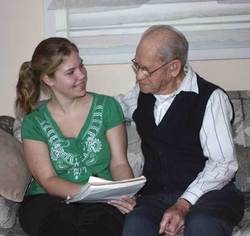Pipestone Flyer
“I have spent my entire life in Calgary”, declares Lisa Oberding, “but I have fond memories of visiting my grandparents when they used to live in Millarville, then moved to Pigeon Lake and finally to Wetaskiwin. And especially that place in Millarville. I remember lying in a hammock outside in the forest, the trees, and listening to my grandfather (Roy Foster, Wetaskiwin) tell me about the various plants, mushrooms, and all the cool stuff.”
This is the same young lady who comfortably uses terms like - highly toxic phenols and aromatic compounds, toxic and corrosive carboxylic acids (naphthenic acids); often are recalcitrant, having complex structures; bioremediate; the xylE gene (BBa_J33204) in order to cleave catechol.
Lisa is a member of the University of Calgary 2012 iGEM team of undergraduate students (and staff) that developed bacteria that could destroy the toxins in oilsands tailings ponds. “iGEM is the International Genetically Engineered Machine competition, an annual undergraduate synthetic biology contest that sees students design different biological systems to run in living cells.” The U. of C. team recently competed in the International Genetically Engineered Machine competition held by the Massachusetts Institute of Technology (MIT) and was awarded 16th place out of 190 teams worldwide, for the best Human Practices award.
Lisa’s grandfather judiciously and proudly follows her career and more recently the progress of the iGEM team. He proudly summarizes. “Lisa graduated in Molecular Biology with Class 01 A Plus honors. She is one smart cookie. This team on Molecular Biology have built a working model of removing waste hydrocarbons from tailing ponds in the production of petroleum products including the Tar Sands, and refining them back to environmental friendly, combustible hydrocarbons.
Lisa was picked to be the leader of a team of 26 to compete for the Worlds Competition for Western Canada, Western United States, North America, and finally the World. They competed at the University of Alberta, Edmonton, and won first place. Then they were sent to Stanford University in California, and won first place out of 26 States and won more gold medals that any team has ever won. In November they went to the University Of Massachusetts in Boston, to compete for the Worlds. We are all pretty proud of her.” My grandfather’s influence. For me, that was a big part of my going into science
Lisa has achieved many honors during her short but productive career. She describes how it all began. “One of my fondest memories of Christmas time is being there (at her grandparent’s home in Millarville) when I was really little and waking up in the middle of the night and going to the window and looking outside. It was snowing and crispy-quiet and there were 12 deer standing around the salt lick my grandfather had put out for them. They were staring at the window. It was so cool.
So yes, my grandfather had a big influence. For me that was a big part of my going into science. Having the ability to go out in nature and learn about these things from my grandfather and learn about nature. Things that you don’t get to know in a city. When you get out and get connected with nature and have someone who cares about it and can tell you stories about what he knows about wild flowers and birds and go fishing and all the different fish in the lake, you really start to understand how nature works. And how ecosystems work. It inspires you to be intrusted in it.
Then following through, I fell into science and kinda progressed to where I am now. But if I had not been exposed to outdoorsy stuff as I was every time I visited grandpa and grandma, I don’t think I would have been nearly as passionate about what I do.”
Tailings ponds are large bodies of water containing toxic compounds that accumulate as a byproduct of the oil extraction process in the oil sands of northern Alberta. These toxic and corrosive compounds are a potential environmental and economic concern to Alberta and to other areas. The University of Calgary 2012 iGEM team aims to develop a collection of toxin-sensing and degrading organisms to detect and destroy (bioremediate) the toxins, turning them into useable hydrocarbons.
The removal of these compounds is becoming increasingly important, especially as government bodies start to become more proactive, implementing stricter regulation. Presently, there are a variety of solutions to remove these compounds from the environment by chemical means. These methods involve the use of chemical agents or the physical removal of contaminated soil or water samples and storing these products in contained areas (Scott et al. 2005). There is still however, no efficient, environmentally friendly mechanism for this to occur.
The 2012 iGEM team feels they have the solution. They have discovered microorganisms that detect where toxins are in the tailings ponds and will convert them into useful products.
In closing, Lisa shares her philosophy of life
Lisa is a confident, well-articulated, down-to-earth, intelligent young lady. As young as she is, she has already accomplished a great deal including instilling a philosophy of life suited to her personal needs. “I’ve had close things with friends (problems and illnesses) and with people I know that I have heard about, that guides my lifestyle. You really have to live life as each day is your last because you never know if it will be. Because life is way too short and way too precious you should not be spending time doing something that doesn’t make you happy. So far that is what I have managed to do with my decisions. Going to university, going into biology, doing this kind of a project, making this my career. (I am) Doing something that I enjoy, that I feel important and that makes me happy. And it’s led to amazing opportunities so far.” And Lisa continues to stress the importance of the influence her grandparents had on her past and on her future.